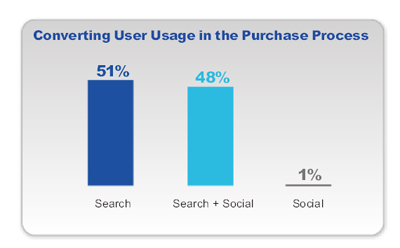The impact that search and social media have on a consumer’s purchase has never been disputed. I have always maintained that they were always joined at the hip. In a recent GroupM Search and comScore study this has pretty much been verified. Search drives the intent or consideration to buy, and social locks up or seals the intent and turns it into a conversion.
Interestingly, the research show that search alone is still a powerful tool in online buying intent, behavior and research. Always will be IMO, but what really caught my eye though was how little online buyers relied on social alone as the primary driver to a purchase. The internet is too broad and delivers too much information in regards to research on a buying decision to just rely on a social recommendation. Why? Because we still want the best deal possible. Relying on one piece of info, i.e. a recommendation from Twitter or Facebook isn’t enough for today’s savvy online customer. We start with search, we add social in there and then we finish with search.
The results from the survey/study revealed the following.
What does this really mean? Ignore the power of search at your own peril and relying solely on social to drive consideration and conversions is a risky proposition.




This if flat out huge, although I’ve been saying this for two years. The reasons are so easy to fathom, I can’t for the life of me figure out why social media is so over-estimated for business and the bottom line.
First, there’s basic consumer psychology which includes what is useful and not useful info on buying (including how people one doesn’t know influence, or rather do NOT influence).
Then there’s the stream/social media issue which means that so few of followers and friends actually see, then read, then act on what someone writes, that the “message” has no impact.
A bit of an oversimplification here, I’ve written about this stuff elsewhere, and pretty much given up on social media topics, so I’m glad people are starting to look at the REALITY of social media/business, rather than what I call the “hype and hope”.
Thanks. Will share this everywhere I can.
Marc
This is a good start, but I think you need to look at more traffic sources in order to get a fuller picture. In particular, this data ignores email.
I've just completed a multi merchant study looking at traffic sources that reached the shopping cart and then went on to convert. This showed that for ecommerce sites at least, email is the largest converting traffic source by some margin. The research can be found here: http://seewhy.com/blog/2011/05/18/website-traffic-source-analysis/
But these traffic sources don't work in isolation. So I think we need to look at search as potentially the first step in a multi-step process
We know that it may take many visits to achieve a conversion, not a single visit. So new traffic may not lead directly to a sale, but if it leads to a micro-conversion, such as a newsletter sign up, registration or social login, then this is very valuable. So perhaps we should be looking at search and social as a stepping stone on beginning to build a relationship, which ultimately will probably only turn into a sale after a sequence of touches.
In the majority of cases, this data shows that the last touch will more than likely be an email.
The lesson that I take from this data is a reminder that the majority of sales come from people you already know, and who already know you. This is intrinsically obvious, but we often forget it in our relentless quest for more traffic.
Charles @webconversion